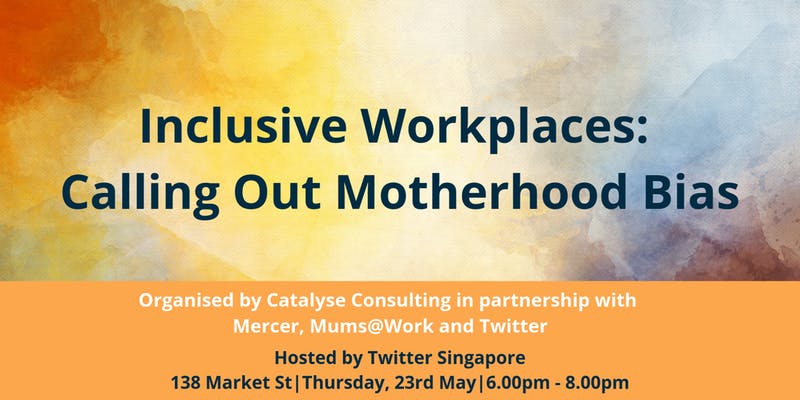-
Advocacy Theme
-
Tags
- Abortion
- Adoption
- Caregiving
- CEDAW
- Disability
- Domestic Violence
- Domestic Workers
- Harassment
- Healthcare
- Housing
- International/Regional Work
- Maintenance
- Media
- Migrant Spouses
- Migrant Workers
- Muslim Law
- National budget
- Parental Leave
- Parenthood
- Polygamy
- Population
- Race and religion
- Sexual Violence
- Sexuality Education
- Single Parents
- Social Support
- Sterilisation
- Women's Charter
23 May 2019 Panel Discussion: Inclusive Workplaces – Calling Out Motherhood Bias
May 15th, 2019 | Employment and Labour Rights, Events, Family and Divorce, News, Women in Leadership
It so happens that the majority of Singaporean women in their prime are mothers as well. On average, Singaporean women older than 30 are more likely to leave the workforce entirely or work part-time, and not necessarily by choice.
One reason that is commonly attributed to this phenomena is termed the “motherhood bias“, a form of gender-based discrimination in which employers and colleagues view mothers, or pregnant women, as less competent and less committed to their jobs.
The ensuing impact (overt or subtle) suffered by women in this position further exacerbates existing gender disparity as workers become parents in Singapore. Inflexible workplace policies for mothers, how performance appraisals are conducted, the interview processes and the unequal roles in parenting are some of the ways in which motherhood bias manifest.
Though Singapore has made clear strides towards gender equality, barriers remain to mothers working full time, working in sectors where they might earn higher pay – or even working at all. According to the Ministry of Manpower’s Labour Force Survey 2018, the vast majority of Singaporean women outside the labour force in their 30s (81%) and 40s (82%) were not looking for a job. This was largely due to family responsibilities – the most common reason cited by respondents in their 30s (56.5%) was childcare.
Let us reflect on the “cost” of the motherhood bias.
In March 2018, Manpower Minister Josephine Teo highlighted in Parliament that comparative to Singaporean men, fewer Singaporean women achieve retirement adequacy in terms of being able to meet their CPF Basic Retirement Sum. A 2018 report by McKinsey Global Institute (MGI) estimates that advancing gender equality could boost Singapore’s gross domestic product (GDP) by an additional US$20 billion, or 5%, by 2025.
Join us for a panel discussion on May 23rd, as we explore questions such as:
- What kind of recruitment, remuneration and career progression policies can employers put in place to retain Singaporean mothers?
- What needs to change to make it easier for Singaporean mothers to return to work?
- What can mothers do to increase their likelihood of remaining in the workforce?
- What practices have worked for organisations in other countries?
The panel will feature:
- Corinna Lim, Executive Director at AWARE
- Godelieve van Dooren , Partner at Mercer
- Sher-li T, Founder at Mums@Work
- Payal Pisal, Parenthood Committee member at Twitter
- Panel Moderator: Roslina Chai, Managing Director at Catalyse Consulting




